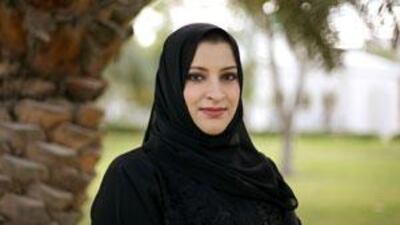The first female Emirati faculty member of the Masdar Institute reflects on her substantial achievements and sets her sights on being an example to other UAE nationals to drive them towards their own fulfilling career. She graduated with a physics degree, travelled to the US to earn a PhD and gain "life experience" and while there went out of her way to build bridges in an uneasy post-September 11 climate.
It was an interest in technology that drew Dr Amal al Ghaferi to research science and led her to become the first female Emirati faculty member at the Masdar Institute of Science and Technology in Abu Dhabi, the research arm of the carbon-neutral Masdar City. Now she has an even bigger goal: to become an inspiration to other UAE nationals, proving by her own success that they too can have a fulfilling career that pushes the boundaries of knowledge.
Dr al Ghaferi, an assistant professor, says: "I think the Masdar Institute is a unique place in the world and I think people from the UAE need a role model. It is important to show them an example of a researcher." After studying at UAE University in Al Ain, Dr al Ghaferi earned her PhD in materials science and engineering from the University of Pittsburgh. It was difficult at times, adjusting from the quiet charm of Al Ain to a foreign land, and the big city bustle - she found the sirens of ambulances particularly alarming - but the transition was made easier by Dr al Ghaferi's parents, who lived with her during the first year.
Indeed Dr al Ghaferi's parents have always been keen for their high-flying daughter to push academic boundaries. "I come from an educated family and my father was the first to encourage me to get my PhD, and my mother pushed me the whole time to get my PhD before the age of 30," she says, with a smile. Dr al Ghaferi had been in the US a year when the September 11 attacks happened. Afterwards, she made sure to connect with Americans, hoping with gentle persuasion she could defuse potential tensions.
"I did more outreach with people so they changed their ideas about Arab Muslims and the UAE," she says. "I remember I was wearing my hijab there and just to show them our religion is respectful of other religions, I joined people in Sunday mass. It was a nice experience for me. I sat with them and talked about how people in the end are like each other and are not different from each other." Indeed, Dr al Ghaferi found that her hijab made her more recognisable in Pittsburgh and this helped strengthen friendships.
"To people in Pittsburgh, I was a friend with my scarf, not a stranger," she says. "People knew me as a friend. And every year I made sure I got a Thanksgiving invitation." Before getting too settled at Masdar, she will spend another year studying in the US, at the Massachusetts Institute of Technology, and then return to set up her own research group. She plans to investigate nanoparticles, and how the minuscule components can be used to make better-performing solar materials.
The importance of Masdar, Dr al Ghaferi believes, extends beyond the goal of energy savings by using alternative energy sources. She says the project, which is being spearheaded by Mubadala, should be seen as a template for the UAE and beyond. "I think Masdar is just the beginning of this thing in the UAE," she says. "I think Masdar will be able to drive renewable energy sources in the whole of the UAE and hopefully the whole of the Middle East and the world."
The Masdar Institute's outreach work, which connects it to the country's ministries, is crucial in driving this, she said. With her second stint in America imminent, Dr al Ghaferi is looking to the future and what she hopes to achieve with her research group when she returns. Working alongside her will be a postdoctoral researcher and PhD and master's students. "I think I will have great benefits from establishing a research group," she says. "Once you have four or five minds working together, it's much better than having just your own work and projects. There will be great opportunities for all of us."
@Email:dbardsley@thenational.ae


